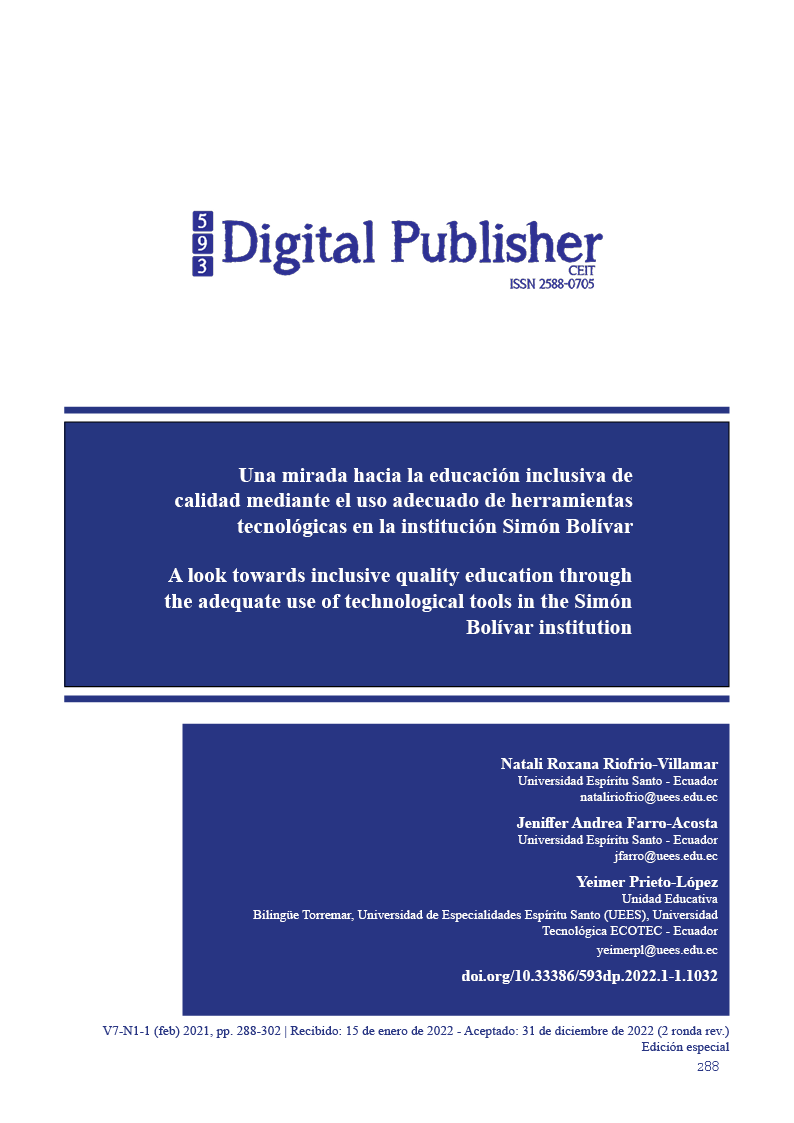A mirada hacia la educación inclusiva de calidad mediante el uso adecuado de herramientas tecnológicas en la institución Simón Bolívar.
Main Article Content
Abstract
This article arises from the need to adjust inclusive education through the use of theoretical or technological strategies during the time of the Covid-19 pandemic, this was a challenge for managers, teachers, students and parents because they did not count with the necessary knowledge about the use of ICT.
The main objective of our article was to provide a Theoretical Strategy aimed at teachers for the use of technological tools that allow them to carry out an inclusive quality education at the Simón Bolívar institution.
Technology plays an important role in the teaching and learning process, allowing students to acquire knowledge in a personalized way according to their special needs.
The use of the methodology resides in the bibliographic review of scientific publications related to inclusive education issues based on the theoretical systematization according to the problem studied, using the qualitative and quantitative approaches, with the qualitative approach we collect the information and with the quantitative approach. The analysis of the results obtained in the data collection techniques was carried out, thus facilitating the necessary statistics.
To conclude, a training process will be implemented so that teachers are prepared in the use of the technological tools of the 21st century and thus achieve an interactive education through the different virtual platforms that allow meaningful, inclusive and quality learning.
Downloads
Article Details

This work is licensed under a Creative Commons Attribution-NonCommercial-ShareAlike 4.0 International License.
1. Derechos de autor
Las obras que se publican en 593 Digital Publisher CEIT están sujetas a los siguientes términos:
1.1. 593 Digital Publisher CEIT, conserva los derechos patrimoniales (copyright) de las obras publicadas, favorece y permite la reutilización de las mismas bajo la licencia Licencia Creative Commons 4.0 de Reconocimiento-NoComercial-CompartirIgual 4.0, por lo cual se pueden copiar, usar, difundir, transmitir y exponer públicamente, siempre que:
1.1.a. Se cite la autoría y fuente original de su publicación (revista, editorial, URL).
1.1.b. No se usen para fines comerciales u onerosos.
1.1.c. Se mencione la existencia y especificaciones de esta licencia de uso.
References
Acuña, M. (23 de Mayo de 2017). Aprendizaje colaborativo en los ambientes virtuales. Recuperado el Diciembre de 2021, de https://www.evirtualplus.com/aprendizaje-colaborativo-ambientes-virtuales/
Aguilera Hintelholher, R. M. (28 de Enero de 2013). Identidad y diferenciación entre Método y Metodología. Recuperado el Octubre de 2021, de https://www.redalyc.org/pdf/4264/426439549004.pdf
Aguilera, R. (Enero-Abril de 2013). Identidad y diferenciación entre Método y Metodología. Recuperado el Octubre de 2021, de http://www.scielo.org.mx/pdf/ep/n28/n28a5.pdf
Bechallange. (05 de Diciembre de 2020). Comparativa entre Aprendizaje Basado en Proyectos (ABP), Aprendizaje Basado en Problemas (ABProblemas) y Aprendizaje Basado en Retos (ABR). Recuperado el 2021, de https://blog.bechallenge.io/comparativa-entre-aprendizaje-basado-en-proyectos-abp-aprendizaje-basado-en-problemas-abproblem-y-aprendizaje-basado-en-retos-abr/
Booth, T., & Ainscow, M. (marzo de 2015). https://downgalicia.org. Obtenido de https://downgalicia.org/wp-content/uploads/2018/01/Guia-para-la-Educacion-Inclusiva.pdf
Buey, L. D. (2010). revistas.uned.es. Obtenido de http://revistas.uned.es/index.php/reop/article/view/11538/11014
Castillo, R. G., & Cerro, M. J. (2019). http://scielo.senescyt.gob.ec. Obtenido de http://scielo.senescyt.gob.ec/scielo.php?script=sci_arttext&pid=S1390-86422020000100113
Colegio Williams. (14 de Julio de 2021). Constructivismo: ¿Qué es y cuáles son sus beneficios? Obtenido de https://blog.colegiowilliams.edu.mx/que-es-constructivismo-sus-beneficios
Constitucion de la Republica del Ecuador. (2008). https://www.oas.org/. Obtenido de https://www.oas.org/juridico/pdfs/mesicic4_ecu_const.pdf
Contento, A. (2018). remca.umet.edu.ec. Obtenido de https://remca.umet.edu.ec/index.php/REMCA/article/view/48/154
DÍAZ, L., & UNESCO. (2017). EDUCACIÓN INCLUSIVA. CONCEPTUALIZACIÓN Y APROXIMACIÓN AL SISTEMA EDUCATIVO DE SINALOA (MÉXICO). Obtenido de https://www.comie.org.mx/congreso/memoriaelectronica/v14/doc/2209.pdf
Educación2020. (2020). Aprendizaje Basado en Proyectos. Recuperado el Octubre de 2021, de https://educacion2020.cl/aprendizaje-basado-en-proyecto/
Educaweb. (1998). Orientación Académica. Recuperado el 2021, de Herramientas y recursos TIC que te ayudarán a estudiar en función de tus objetivos y habilidades: https://www.educaweb.com/contenidos/educativos/tecnicas-estudio/estudiar-ayuda-nuevas-tecnologias/
García, T. C. (2021). revistas.unlp.edu.ar. Obtenido de https://revistas.unlp.edu.ar/OrientacionYSociedad/article/view/12363/11167
Hintelholher, R. M. (Abril de 2013). Identidad y diferenciación entre Método y Metodología. Recuperado el Noviembre de 2021, de http://www.scielo.org.mx/scielo.php?script=sci_arttext&pid=S0185-16162013000100005
Martínez, S. J., Calzada, I. G., Sandoval, A. G., & Domínguez, A. L. (2017). https://dialnet.unirioja.es/. Obtenido de https://dialnet.unirioja.es/servlet/articulo?codigo=6247305
Molina, M. (2015). La realidad de la educación inclusiva en el Ecuador. Obtenido de http://www.revistarupturas.com/la-realidad-de-la-educacion-inclusiva-en-el-ecuador.html
Monroy Correa, G. (14 de Junio de 2020). HERRAMIENTAS TECNOLÓGICAS APLICADAS A LA EDUCACIÓN A DISTANCIA. Recuperado el 2021, de https://www.gicesperu.org/articulo.php?id=q+sNp2eAe7ON4EYpqsMuAQ==
Naciones Unidas. (Octubre de 2016). EDUCACIÓN DE CALIDAD. Recuperado el 2021, de OBJETIVOS DE DESARROLLO SOSTENIBLE: https://www.un.org/sustainabledevelopment/es/wp-content/uploads/sites/3/2016/10/4_Spanish_Why_it_Matters.pdf
Núñez, J. M., Salinas, S. C., & Castro, F. G. (2010). scielo.org. Obtenido de http://www.scielo.org.mx/pdf/argu/v23n62/v23n62a3.pdf
Opertti, R. (2019). rutamaestra.santillana.com.co/. Obtenido de https://rutamaestra.santillana.com.co/wp-content/uploads/2019/03/la-educacion-inclusiva-el-adn-de-la-educacion.pdf
Piedra, C. G. (2015). dspace.ups.edu.ec. Obtenido de https://dspace.ups.edu.ec/bitstream/123456789/8813/1/UPS-CT005030.pdf
Rodriguez, C., Ramos, M., Santos, M., & Fernández, J. (22 de Julio de 2019). El uso de la gamificación para el fomento de la educación inclusiva. Recuperado el Diciembre de 2021, de https://dialnet.unirioja.es/servlet/articulo?codigo=7454938
RODRÍGUEZ, L. M. (2017). https://www.comie.org. Obtenido de https://www.comie.org.mx/congreso/memoriaelectronica/v14/doc/2209.pdf
Rojas, M. A., Verdugo, R. M., & Castr, V. J. (2020). redalyc.org. Revista Scientific, 334-351. Obtenido de https://www.redalyc.org/journal/5636/563662985019/html/
Romero, S., González, I., García, A., & Lozano, A. (04 de Julio de 2017). Herramientas tecnológicas para la educación inclusiva. Recuperado el Diciembre de 2021, de https://dialnet.unirioja.es/servlet/articulo?codigo=6247305
SDGF. (2021). Objetivos de Desarrollo Sostenible. Obtenido de Objetivo 4: Educación de calidad: https://www.sdgfund.org/es/objetivo-4-educaci%C3%B3n-de-calidad
Serra, V. (07 de Julio de 2019). Metodología de una aula inclusiva. Recuperado el Diciembre de 2021, de https://revistaventanaabierta.es/metodologia-de-una-aula-inclusiva/
Sevillano, J. G. (2017). https://repositorio.pucese.edu.ec/. Obtenido de https://repositorio.pucese.edu.ec/bitstream/123456789/1117/1/GUEVARA%20SEVILLANO%20J%c3%89SSICA%20.pdf
UDLAP, A. (05 de Marzo de 2012). La calidad educativa se logra con alianzas estratégicas y profesores capacitados: Académica UDLAP. Recuperado el Octubre de 2021, de http://blog.udlap.mx/blog/2012/03/calidadeducativaconalianzasestrategicas/
Unesco. (2021). Liderar el ODS 4 - Educación 2030. Recuperado el Octubre de 2021, de https://es.unesco.org/themes/liderar-ods-4-educacion-2030
Unesco. (2021). UNESCO: La mitad de los niños no escolarizados vive en países afectados por conflictos. Recuperado el Diciembre de 2021, de https://es.unesco.org/news/unesco-mitad-ni%C3%B1os-no-escolarizados-vive-pa%C3%ADses-afectados-conflictos
Universidad Metropolitana. (2014). https://sites.google.com/. Obtenido de https://sites.google.com/site/grupo6derechoalaeducacion/educacion-universitaria/herramientas-tecnologicas




